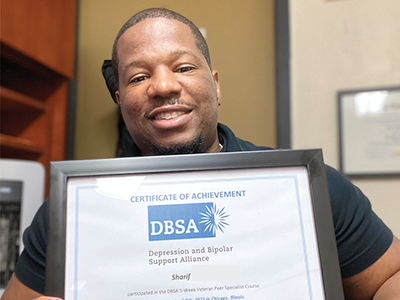Veterans Helping Veterans

Sharif enlisted in the Army National Guard during his junior year of high school. It was something he knew he always wanted to do, just like his older brother.
After serving as a Motor Transport Operator for six years and being discharged honorably at the rank of sergeant, he got a job in security before eventually taking a position with another social services provider. Similar to his experience with joining the army, Sharif knew right away that helping people was his next calling.
“When I started that job, I was studying to be a psychologist,” he says. “I wanted to work with people experiencing homelessness and learn more about why they become homeless and what keeps them down.”
A few years later, Sharif joined Volunteers of America-Greater New York (VOA-GNY) as the Residential Service Manager at East 119th Street Veterans Residence—our East Harlem supportive housing program for veterans.
He says his own experience as a veteran has made it easier to gain the trust of tenants. “I connect with them because I understand,” he says.
This concept is also at the heart of our innovative Battle Buddy Bridge® program.
Developed by and unique to Volunteers of America, Battle Buddy Bridge® (B3) recreates, in the civilian world, the partnership that soldiers had in the military by connecting them with other veterans through a peer support network. Through B3, veterans can receive training to become certified peer support specialists who can help fellow servicemen and women access vital resources like housing, health care, employment—or simply offer a shoulder to lean on when times are tough.
"For veterans, relationships can be strengthened if they feel like the person they're speaking to can relate to them and their experience,” explains Karin McFadden, Program Director at East 119th Street Veterans Residence and the facilitator of B3.
This spring, after pausing due to the pandemic, B3 was brought back in a virtual format. Sharif jumped at the chance to formally expand his skills in this area. Professional development is something VOA-GNY encourages of all employees.
While there were a few differences between the virtual sessions and the pre-pandemic format, facilitators were still able to foster a sense of community and shared experience among participants—an important aspect of B3.
At the end of the week-long training, Sharif and one other VOA-GNY staff member graduated as peer support specialists, with certificates administered by the Depression and Bipolar Support Alliance (DBSA).
Sharif plans to volunteer his new skills at VOA-GNY’s other supportive housing program for veterans located in the Bronx. That way he’ll be able to touch the lives of even more veterans.
“I look forward to using what I’ve learned in B3 and my own experience to mentor to other veterans,” Sharif says. “I’m also excited to continue learning and want to model how education can help improve your wellbeing.”
Sharif wants to train to become a certified substance and alcohol abuse counselor next.
